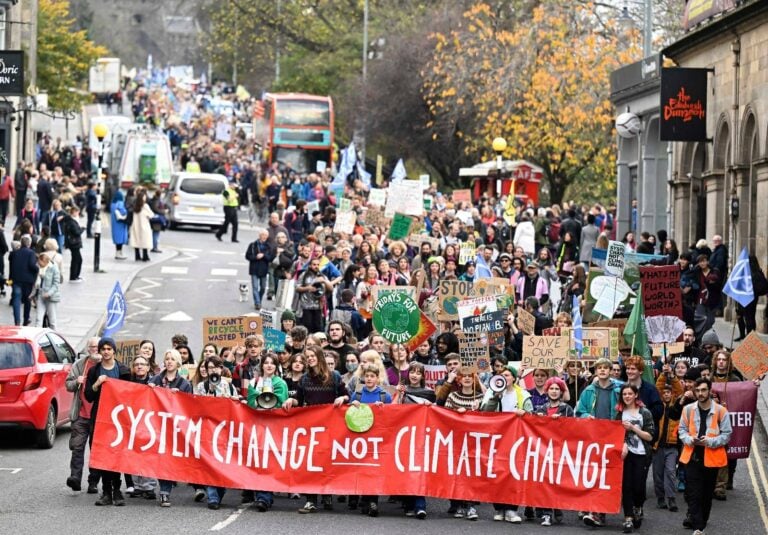
“Liberalisation limits regulation that stabilises financial markets”
In the week that the WTO Public Forum discusses “Seeking answers to global trade challenges” and the G20 Finance and Development ministers meet in Washington, and also three years after the financial crisis erupted in full, re-regulating the financial sector is still on the agenda in many countries, regions and financial forums. However, free trade negotiations that liberalise financial services have continued to propagate deregulatory rules as it is business as usual. The light-touch regulation of the last decades has shifted within Europe to a more restricting regulation model – but this has not yet found solid ground in the EU position in on-going trade negotiations.
For example, the European Union (EU) and India are negotiating a free trade agreement (FTA) which encompasses liberalisation of financial services; even since the financial crisis has highlighted the fact that liberalised financial services have damaging effects on financial stability. The EU demands to remove restrictions on the admission of foreign banks in India, particularly those related to licensing of bank branches. “The large scale financial and economic problems caused by banks in many European countries do not deter these banks from entering Indian and other markets and asking them for more openness,” says Vander Stichele. “On the contrary, the European banks’ strategy is to move out of the recessionary conditions in the EU by making investments in those countries which are least or not affected by recession. And FTAs pave the way for Western banks to get what they need.”
“Foreign banks have so far shown to be the bankers of the growing group of rich and higher middle classes in developing countries without making investments to reach the less profitable markets especially in rural areas. In India only domestic banks have to lend 18 percent to the agricultural sector and 10 percent to the weaker sectors of society.” However, the non-discrimination rule in FTAs and GATS (the multilateral free trade negotiations on services within the World Trade Organisation) are such that foreign companies can be treated more favourable but not less favourable. This makes it more difficult to discriminate in favour of banks and financial operators who are less active in destabilising financial products and more active in rural areas or promoting environmentally friendly activities.
Financial stability is a public good
The FTA rules – also the GATS rules- are largely based on serving the interests of the financial sector. Banks lobbied for these rules arguing that stricter regulations and supervision were an unnecessary cost that would make the financial industry inefficient, and less competitive and innovative. “But now it is widely acknowledged that financial stability is an important public good that has priority over corporate interests,” argues Vander Stichele.
Most worrying, regarding the Vander Stichele, is that on-going liberalisation limits the right to regulate and therefore takes away instruments for financial stability. Many regulations, laws, measures, qualitative requirements and administrative decisions by host countries can be considered as barriers to trade in FTAs and according to existing or potentially new GATS rules. The texts of the GATS and FTAs contain articles and rules that restrict or even prohibit particular regulations from being implemented. Countries that have agreed to liberalise their financial sector wholly or partly under GATS or/and an FTA have to respect those restrictive rules otherwise they risk costly WTO or FTA dispute settlement.
Is new regulation never allowed under FTA and GATS rules? Some proponents of liberalised financial markets argue that countries can take prudential measures “to ensure the integrity and stability of the financial system” and to protect investors, depositors or clients of a financial services supplier by using the GATS Annex on Financial Services and the FTA subsections on the regulatory framework in financial services. But what constitutes a prudential measure is not defined; it is a grey area with lots of uncertainties, Vander Stichele warns. “This means that prudential measures can be brought before a WTO or FTA dispute settlement panel and risk being sanctioned, which undermines the priority that should be given to the stability of the financial system and even the economy,” says the SOMO researcher.
Regulations might be in breach with FTA and GATS rules
The EU has during the GATS negotiations challenged some laws and rules other countries put in place after the previous financial crisis (1997) as a remedy against future financial crises, such as more capital reserves to be held by foreign banks in the host country . But now the EU itself is proposing stricter capital reserves as a centre piece of the reforms to reach financial stability.
In its current financial reform process, the EU considers limiting trading in derivatives, as their risky and speculative nature and lack of transparency have been shown to aggravate financial crises. However, limiting the amount of speculators that can trade in commodity derivatives might be against the GATS and FTA prohibitions of limiting total numbers of services operations, the total quantity of services, or limitations on the total value of service transactions, expressed through quotas.
In the newly negotiated FTAs, controls on cross-border capital flows are heavily restricted, but countries like Brazil, Taiwan, South Korea and Indonesia have all put some restrictions on cross-border capital flows as a protection against excessive speculation. Even the IMF is nowadays in favour of some kind of use of capital and currency controls. Vander Stichele: “The European Commission has even expressed doubts as to whether a tax on financial transactions, as proposed by civil society and some EU leaders such as Chancellor Merkel and President Sarkozy, would be compatible with Article XI of the GATS. So, the interpretation of GATS and FTA rules could restrict policy space seriously.”
Even the bank rescue measures or bailouts by EU member states might be against FTA and GATS rules, because they gave directly or indirectly competitive advantage to their domestic financial industry over those banks from countries that could not pay for bank bailouts. Another example: A new EU law requires hedge funds and private equity funds managers to set a limit on how much they borrow, which constitutes an indirect borrowing limit. Supervisory authorities can impose a stricter borrowing limit to safeguard financial stability. Given that supervisors might experience difficulties to monitor each hedge fund or private equity fund and to prevent financial stability ex ante from too much borrowing, supervisors or potentially a review of this Directive on “alternative investment fund managers” could impose an overall regulatory limit on the level of borrowing: This would be in breach of the market access rule that prohibits “limitations on the total value of service transactions or assets in the form of numerical quotas or economic needs tests”.
Take financial services out of trade negotiations
So what would Vander Stichele recommend policy-makers? “It is increasingly recognised that the financial sector must serve the public interest and contribute to a sustainable and equitable society, a concept not integrated into the FTAs and GATS.” She guarantees that the best way to stabilise the world financial markets and economy at large is to take financial services out of the GATS and FTAs, “because this is the best way to combine financial (re)regulation with trade rules so as to allow financial reforms and trade rules to integrate the public interest as well as sustainability needs into the financial sector”. But as this might be too controversial, a sub-solution might be that all financial regulation should get priority over trade rules and free trade negotiations do not include financial services until full financial stability is restored and new international stability rules are fully in place.
For more information read:
- The SOMO bi-monthly EU Financial Reforms newsletter(opens in new window) , which is part of the project ‘Towards a Global Finance System at the Service of Sustainable Development”.
- Business as Usual? How Free Trade Agreements Jeopardise Financial Sector Reform – SOMO Paper December 2010 written by Myriam Vander Stichele and Roos van Os.
- Rethinking Liberalisation of Banking Services under the India-EU Free Trade Agreement – SOMO Paper September 2009 written by Kavaljit Singh and Myriam Vander Stichele.
See also: the programme of the WTO Public Forum from 19-21 September 2011(opens in new window) , with an OWINFS session on "The Future of Trade in Financial Services: Safeguarding Stability"(read abstract(opens in new window) )
Related news
-
Why share buybacks are bad for the planet and peoplePosted in category:Opinion
 Myriam Vander StichelePublished on:
Myriam Vander StichelePublished on: Myriam Vander Stichele
Myriam Vander Stichele -
 The trillion-dollar threat of climate change profiteersPosted in category:Long read
The trillion-dollar threat of climate change profiteersPosted in category:Long read Myriam Vander StichelePublished on:
Myriam Vander StichelePublished on: -
The treaty trap: The miners Published on:
 Vincent KiezebrinkPosted in category:Publication
Vincent KiezebrinkPosted in category:Publication Vincent Kiezebrink
Vincent Kiezebrink

